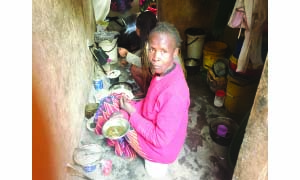By THANDIWE MOYO-
GLOBALLY, women have continued to face many challenges which arise from different factors including the rising cost of living and dwindling economic opportunities.
Added to this is the coronavirus (COVID-19) pandemic.
The pandemic has contributed to poverty among women, a number of whom have lost jobs and are without an income.
As times get harder, the women and girls, particularly in rural areas, do not have opportunities to fend for themselves and lack information compared to those living in urban areas.
The loss of employment, the closing down of businesses occasioned by disruptions in global business trends as a result of COVID-19, has increased poverty among women.
Chibemba Chulu, 49, of Shilika Village in Chingola District is one of the women facing difficulties after she failed to sustain her small scale trading business due to coronavirus.
Ms Chulu, whose business was mainly selling of second-hand clothes, said due to the pandemic, most of her clients stopped buying clothes due to rumours that people could contract the virus from wearing the second-hand clothes.
She said myths on second-hand clothes and the fear from people to contract COVID-19 has made it impossible for her to continue with the business.
“Some clients told me that they could not buy the second-hand clothes because they were warned that the clothes were used by people with the coronavirus before being brought to Africa. Some customers have just lost interest in shopping since they are told to stay home,” she said.
Ms Chulu, who is also a community school teacher, complained of hunger and lack of income due to the closure of her shops.
Currently, Ms Chulu has no income to sustain herself as well as her three children whom she looks after.
“I have three children to keep. I left my husband because he used to abuse and beat me in full view of my children,” she said.
Ms Chulu said recently, she tried to look for employment as a maid in town but no one could give her a job because of COVID-19 restrictions.
According to Ms Chulu, the interventions introduced by the Government to stop the spread of the pandemic is helping to save people’s lives in society, but she is hopeful that the Government and other stakeholders can also help women who are struggling in rural areas.
She said a good number of women in the rural areas have been badly affected by economic effects of the pandemic and as a result, they need help from well-wishers.
Ms Chulu said the coronavirus pandemic has had a significant impact on the economy and the spillover effects have affected the women.
Chomba Mwamba, 29, an events planner based in Chingola, said her business could not continue because all social gatherings countrywide were stopped.
She said she depended on such gatherings to operate her business and since she could not have any customers, she decided to just stay at home.
Ms Mwamba said previously, she was able to employ a number of people in her events planning business.
But now, since she has closed down, all her workers have not yet found other jobs and some of them had resorted to abusing alcohol.
Ms Mwamba said there is need to help women who have the capacity to work so that they can help their families and also support the nation.
“As woman, we are willing and able to work, but the pandemic has frustrated our efforts. We need to put our heads together and see how we can survive even in such moments because we do not know when this will end,” she said.
The continued spread of the COVID-19 in Africa is raising concern over its impact on women and girls.
It is feared that the vulnerabilities which the women and the girls face are likely to worsen as the pandemic overwhelms health systems.
The impact of the pandemic on women-headed houses, whose income has been disrupted or is no longer available, is profound.
According to the World Bank, the economic hardships arising from COVID-19 are more pronounced on women.
According to a World Bank report, women account for 90 per cent of the labour force in sub- Saharan Africa.
The various factors highlighted above indicate that COVID-19 had put informal sector jobs at risk because most of them rely on businesses that have been heavily affected by the pandemic.
It is for this reason that the Government in Zambia needs to provide ways in which those affected, especially the women, may be assisted to being financially independent.
It is said that ‘once a woman is educated, the whole nation benefits’.
Therefore, it is important to provide an enabling environment and programmes that will support women in society.







